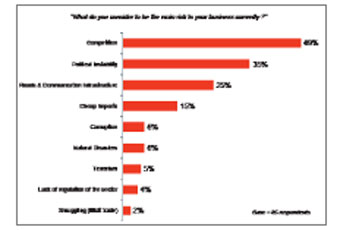
By Rukiya Makuma
Despite 2010 being a prelude to the 2011 general elections, most Ugandan business leaders are optimistic of making more money in future and do not think that political instability poses a serious risk.
In a study carried out by Synovate (fomer Steadman) between Feb. 1 and March 15, the business leaders say competition is their top worry. An overwhelming 90 percent reported that Uganda today is attractive as an investor destination to foreign investors.
The study titled “Uganda Business Leaders Confidence Index” targeted 100 MDs, CEO and directors of leading companies in Uganda. It revealed that 64 percent businessmen agreed that the economy was doing better as compared to six months ago, of these, 12 percent said it was doing “substantially better” and the rest said it was “moderately better”. Up to 59 percent expect it to perform better in the next six months.
This the second highest level of confidence among Ugandan business leaders since the index started.

The highest was in December 2007 when up to 69 percent of respondent were optimistic and the lowest in May 2006 at 44 percent. Just last July, the confidence levels had sunk as low as 47.9 percent.
Ronald Rugadya the Business Development Manager of Synovate says the drop in confidence was caused mainly fear of competition and the global economic crisis.
“2009 saw a lot of companies entering the business sector from all angles,” he says. Companies like Orange, Warid, Smiles and the rebranding of Zain from Celtel in the telecommunication sector, there was the introduction of new products in the beverages market and this kicked off intense competition in affected sectors.
Rugadya says the current optimism is a result of improvement in the economy, the waning of the global financial crisis, and increased service provision especially by the government.
“There has been an improvement in the economy when it comes to transport; through Uganda Investment Authority business people have been able to acquire land; electricity supply has improved and more power dams are being constructed,” he said. He cited the rift valley dams and the Bujagali dam.
According to the business leaders, competition was the biggest threat to their businesses as mentioned by 49 percent of respondents, followed by political instability at 35 percent, Roads & communication infrastructure at 25 percent, cheap imports at 15 percent, corruption and natural disasters at six percent, terrorism at five percent, lack of regulation sector at four percent and smuggling and illicit trade at two percent.

The financial sector was ranked as the best performing sector at 85 percent, followed by ICT/media/ telecommunication at 64 percent, other services came third at 53 percent, manufacturing sector got 52 percent, the Hotel and tourism sector was fifth with 43 percent, and agriculture was the last with 50 percent.
The most optimistic were in the ICT/Media/Telecommunications sector where up to 79 percent of the respondents agreed that performance would be better in the next six months followed by the financial sector at 75 Percent, Hotel and tourism at 71 percent, agriculture at 67 percent, overall at 64 percent, other services at 54 percent and the manufacturing sector at 52 percent.
The research shows that most of the business men who participated in the research concluded that they were willing to implement new products / services at 54 percent, followed cost cutting at 33 percent, expansion to local markets at 30 percent, expansion to other markets at 23 percent, restructuring at 17 percent, cutting capital spending at 12 percent, mergers and acquisitions at 10 percent, narrowing innovation R&D at five percent as business growth strategies while four percent had no strategies.
Perhaps in preparation for the East African Confederation protocol due in July, 47 percent of the business men are willing to implement and extend their businesses in Rwanda, 35 percent in Burundi, 18 percent in DRC, 12 percent in South Sudan, Tanzania and Kenya and six percent were willing to extend to Zanzibar and Mozambique in the next 12 months as a business growth strategy. This is a contrast considering that most business men were travelling to Southern Sudan for business in the past few months.
According to the research by Synovate, Kenya has the highest business confidence level of counties surveyed at 68.9 percent followed by Ghana at 68.3 percent, Uganda at 66.3 per cent, and Tanzania has 61 per cent. The study, targeting heads of companies was also carried out in Kenya, Tanzania and Ghana.
 The Independent Uganda: You get the Truth we Pay the Price
The Independent Uganda: You get the Truth we Pay the Price



